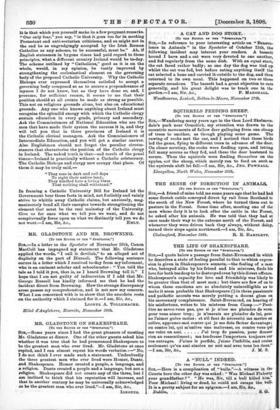THE LIFE OF SHAKESPEARE.
[TO THE EDITOR OP THE "SPECTATOR."] SIE,—I quote below a passage from Saint-Evremond in which he describes a state of feeling parallel to that to which expres- sion is given in Shakespeare's sonnets,—the feeling of a man who, betrayed alike by his friend and his mistress, finds his love for both too deep to be destroyed even by this direst offence. Shakespeare's capacity for love and friendship was likely to be greater than that of most men ; but there are few of us to whom these emotions are so absolutely unintelligible as to make it seem probable that Shakespeare (0 in these passionate and pathetic accents was merely putting a decent gloss on his mercenary complaisance. Saint-Evremond, on hearing of his misfortune, writes to his mistress from Camp :—" Pent- etre ne savez-vous pas, que si je n'ose me plaindre de vous. pour vous aimer trop ; je n'oserais me plaindre de lui, porn ne l'aimer guere moins : et s'il fant de necessite me mettre en colere, apprenez-moi contre qui je me dois filcher davantage; on contre lui, qui m'enleve une maltresse, on contre vous qui
me volez an ami J'ai trop de passion, pour donner rien an ressentiment ; ma tendresse l'emportera toujoars ear vos outrages. J'aime le perfide, j'aime l'infidele, and train seulement qu'un ami sincere ne soit mal avec tons les dens.'






















































 Previous page
Previous page